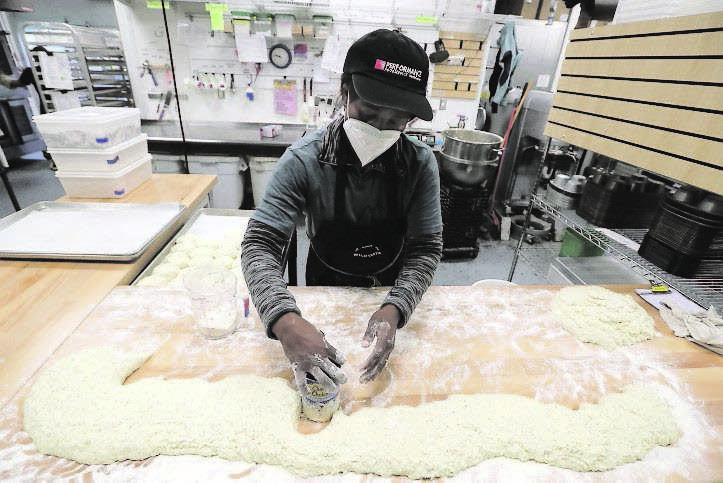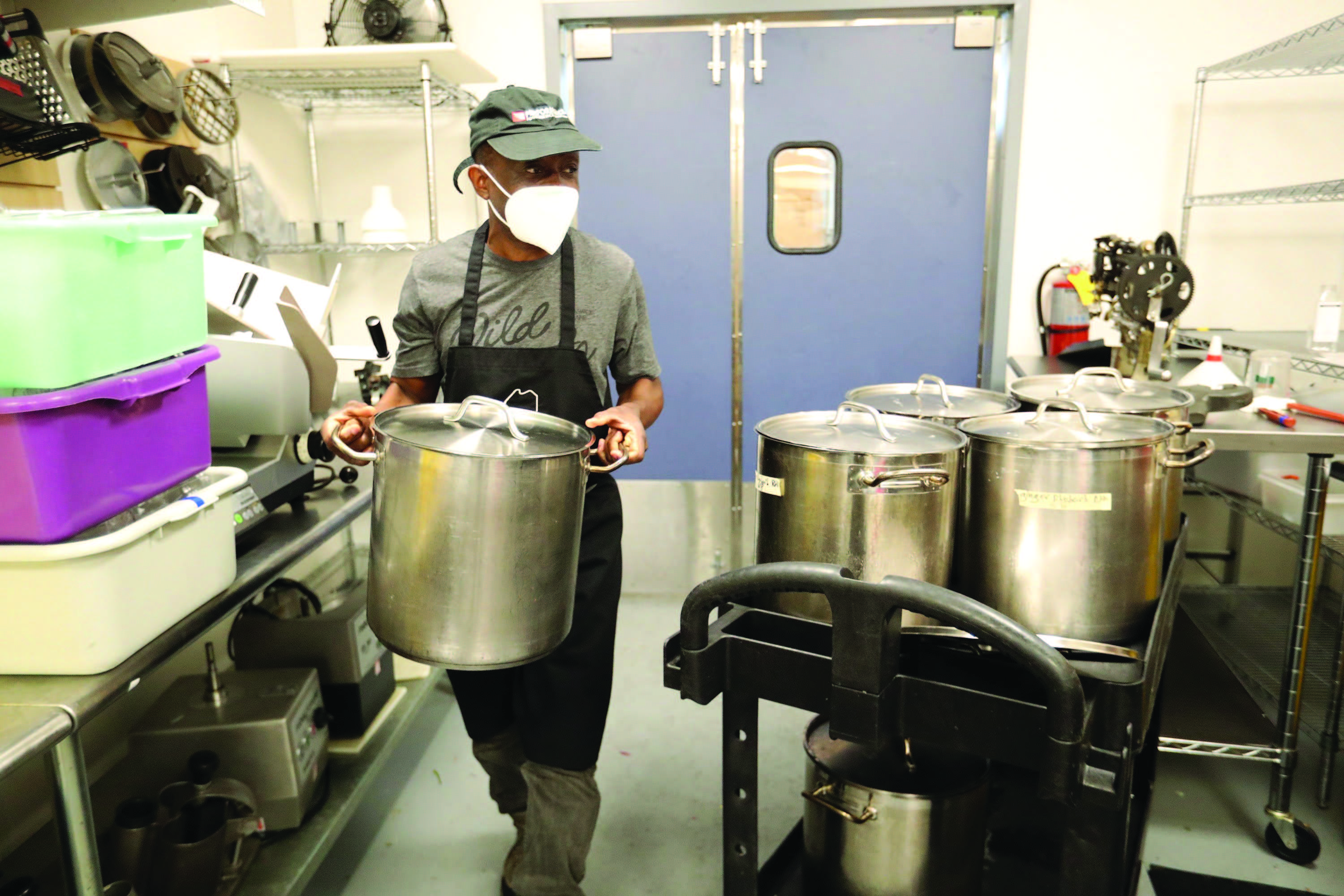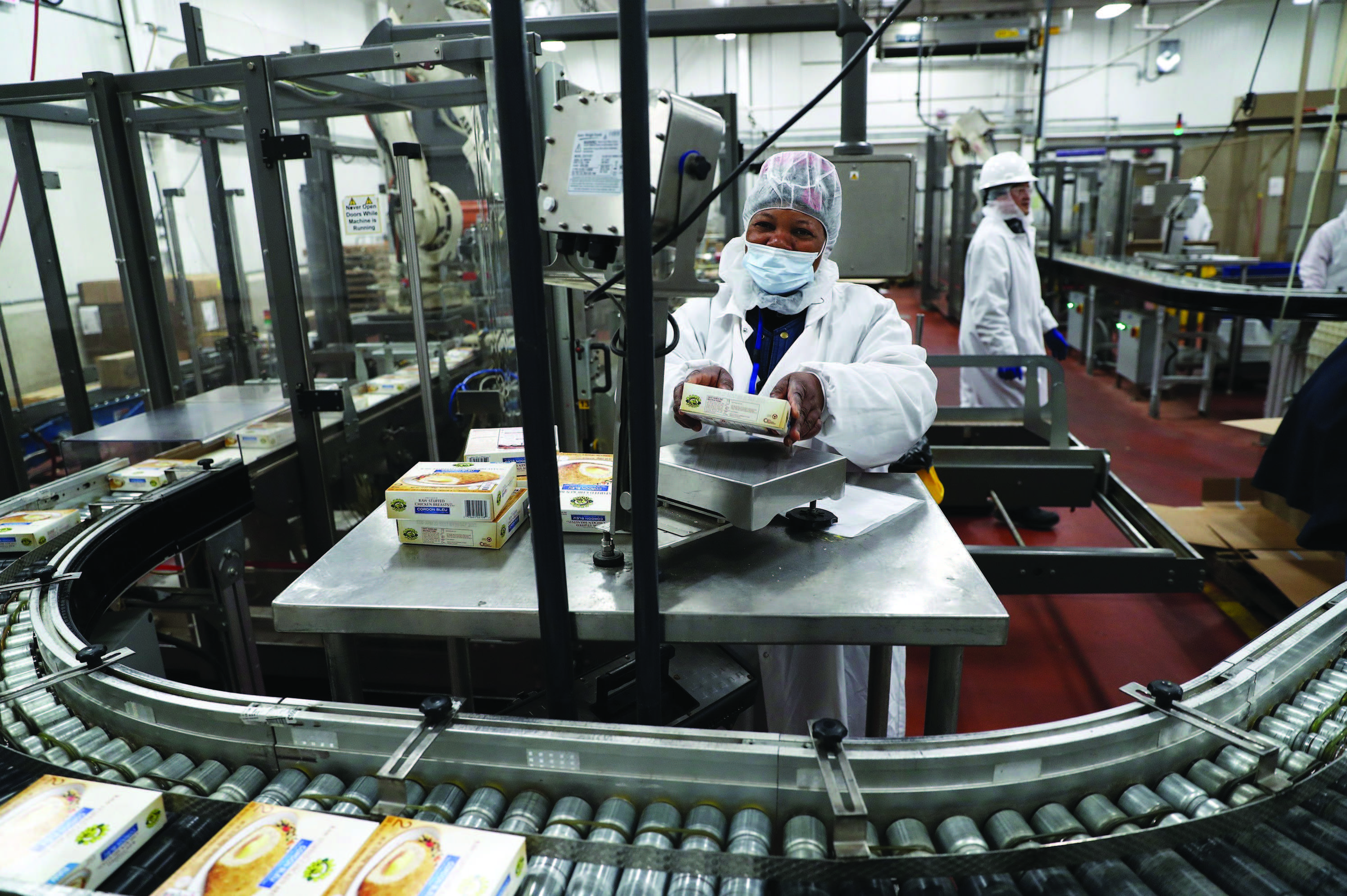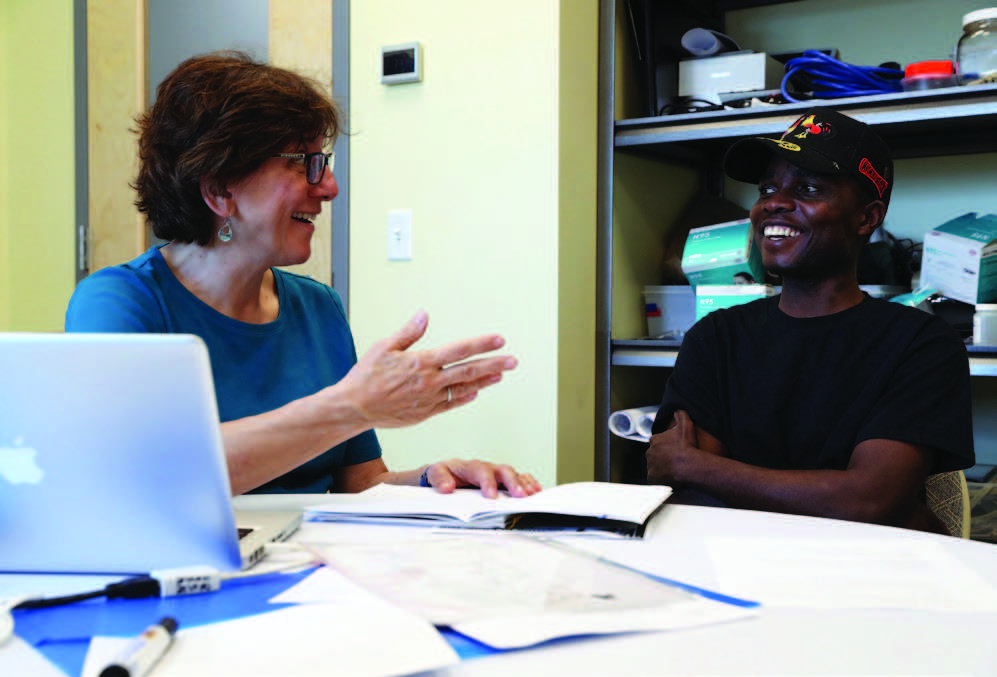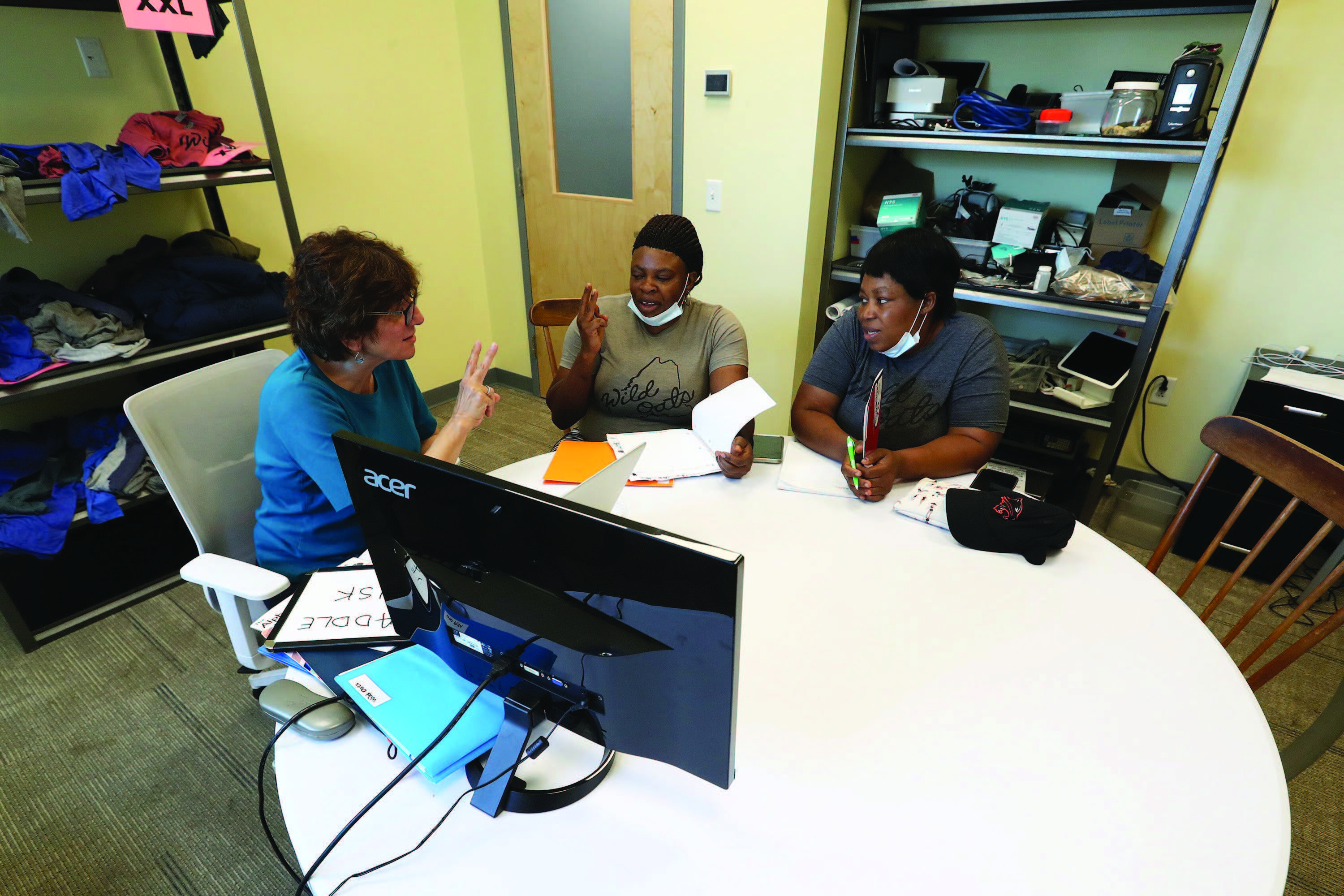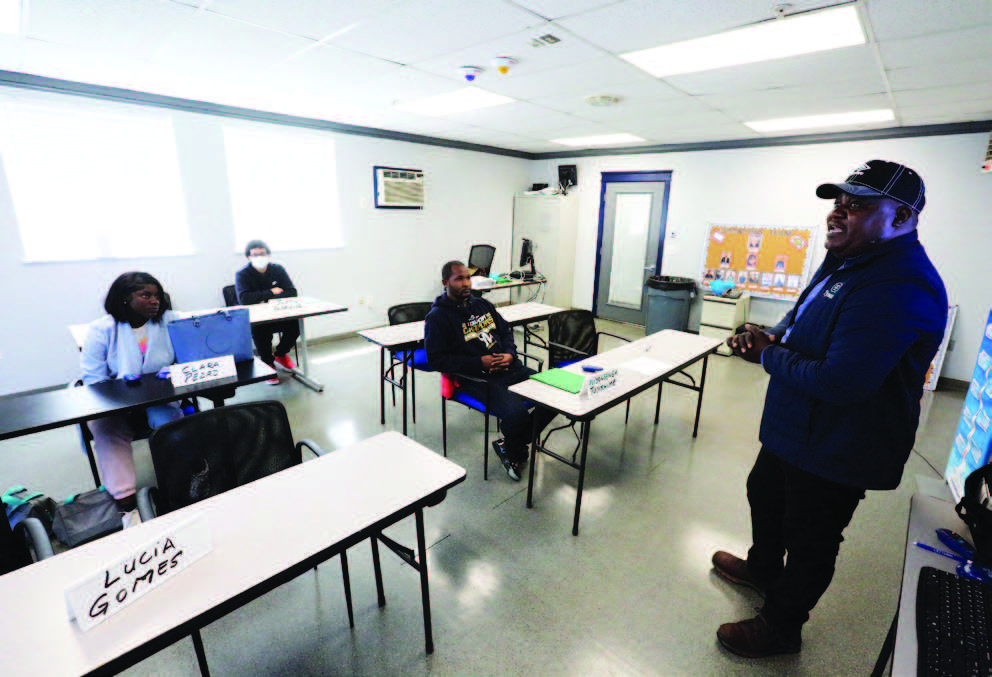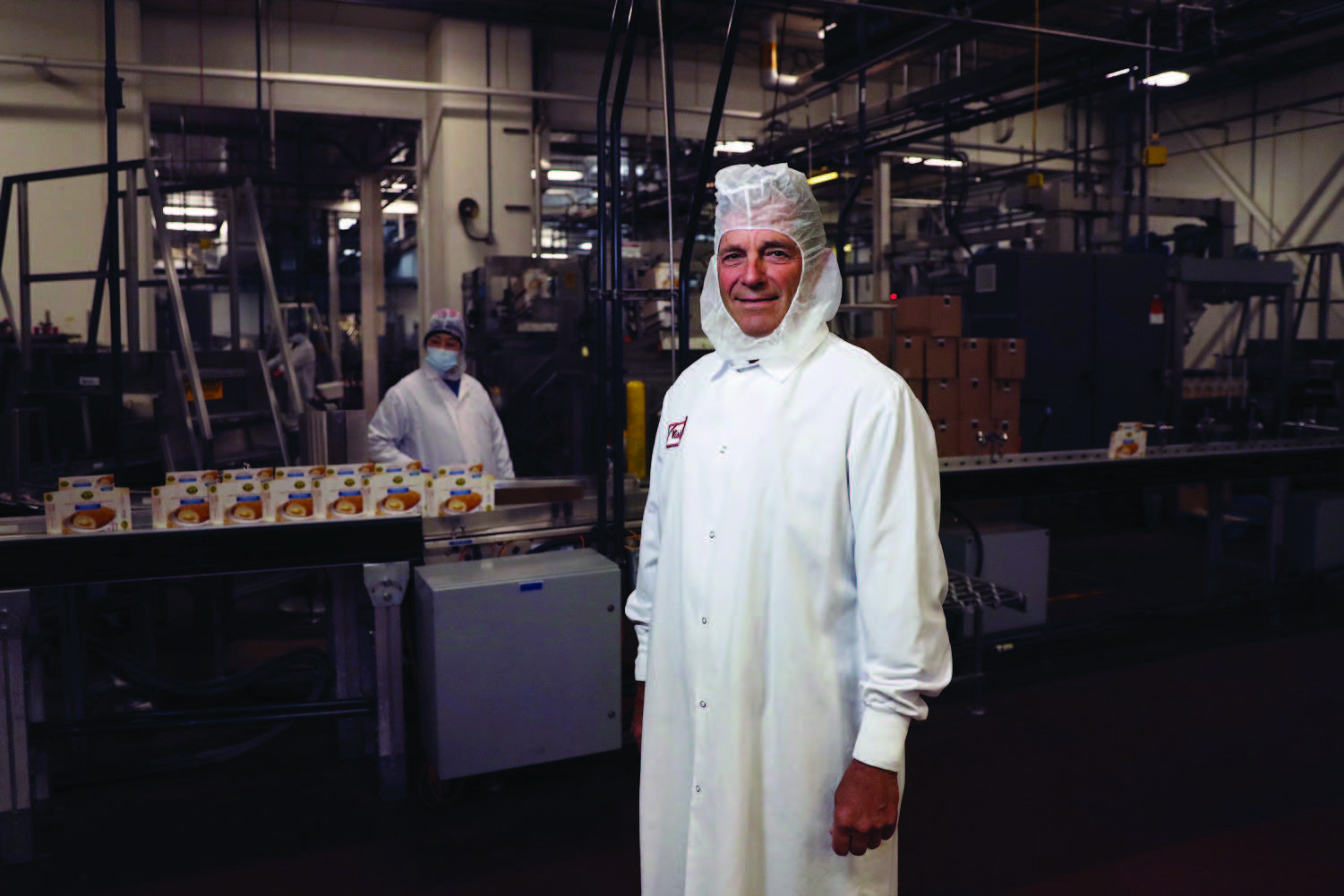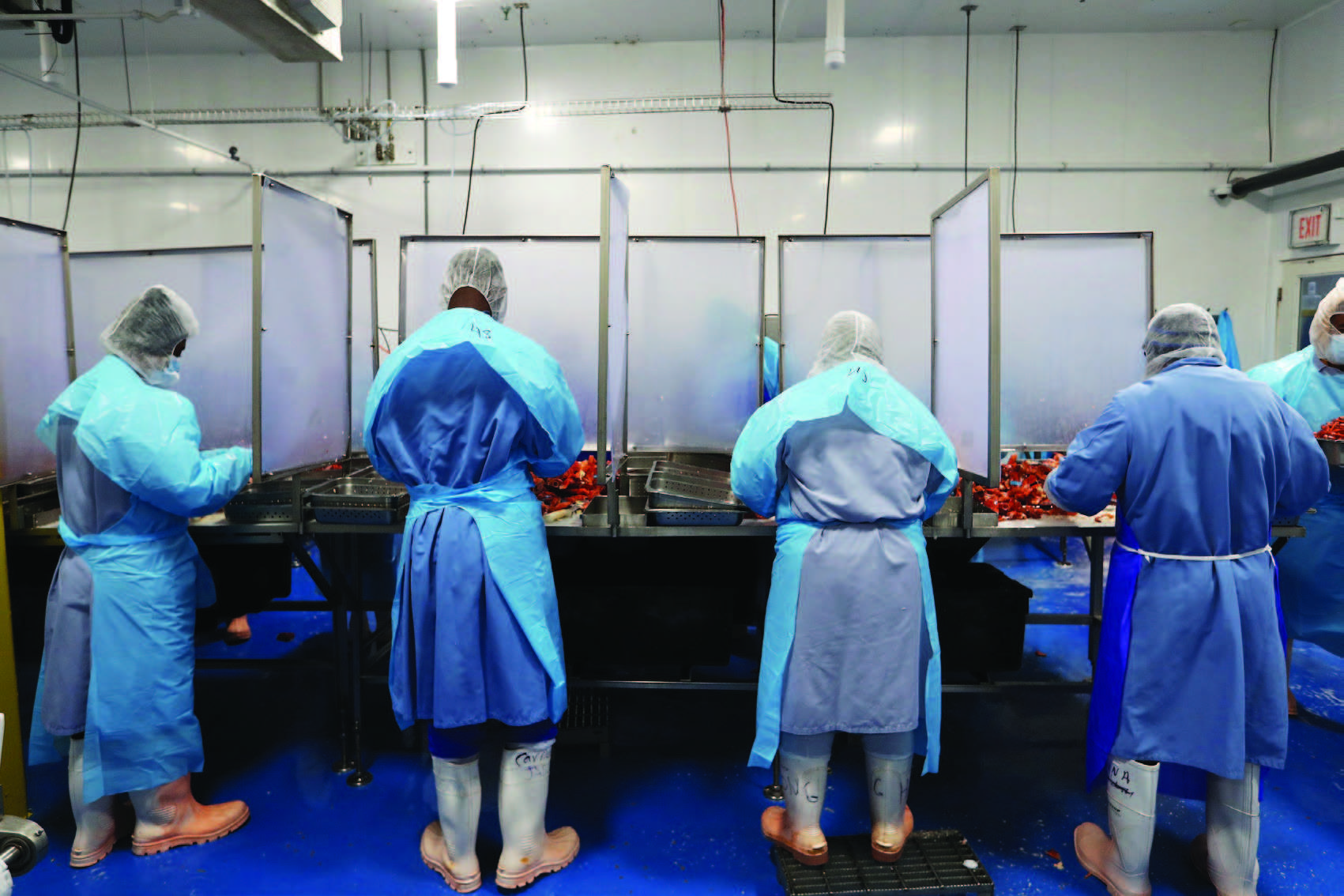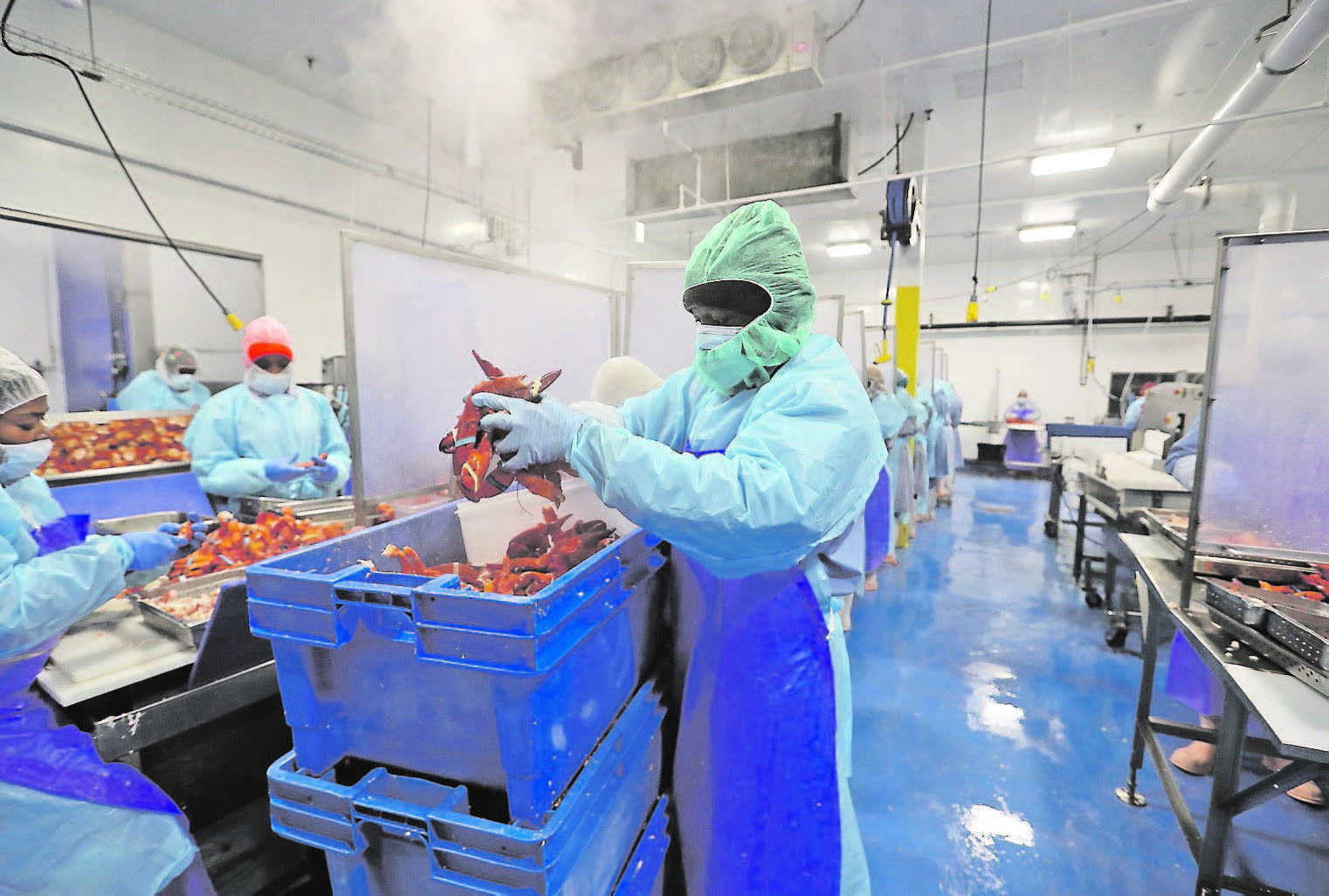
THE IMMIGRANT INFUSION
Third of five parts
Jeannette Tshumu’s hands move methodically as she pushes out a long roll of biscuit dough, dips an empty can into a measuring cup of flour, presses it into the soft dough and twists. She transfers the perfectly formed biscuit onto a tray, moves the leftover pieces into a new pile and repeats the process.
At the other end of Wild Oats Bakery’s labyrinthine kitchen, her husband, Blaise Phambu, oversees the prep area.
While Mamie Kabala and Ana Augusto slice meats and Maravilha Antonio juices lemons, Phambu shows a new employee how to use a large immersion blender in a large container of fruit and juice.
All five employees are asylum seekers from the Democratic Republic of Congo and Angola. They are among the dozen or so foreign-born workers that the Brunswick bakery has hired to boost its workforce at a time when workers are hard to come by.
It hasn’t been entirely smooth sailing – language is a consistent challenge – and Tshumu and Phambu are the only remaining two of the original six new Mainers hired in the spring of 2021. But Marshall Shepherd, managing partner at Wild Oats, said they’ve hit their stride now and the investment has been well worth it.
“These folks are just desperate for jobs that are consistent and pay them decently,” he said. And amid the local and national staffing challenges, Shepherd said, hiring new Mainers has allowed Wild Oats to stay in business.
Immigrants can play a vital role toward filling the gaps in Maine’s diminishing workforce.
But there are obstacles to overcome. Limited funding for English language programs, prohibitive credentialing requirements, and a time-consuming, backlogged federal immigration system are preventing immigrants from getting jobs and, in some cases, are driving them out of the state and country altogether.
About 20,000 workers have left the labor force since the pandemic began, most of them early retirees. As the oldest state in the nation, Maine is projected to lose another 65,000 workers by 2029 as baby boomers retire.
There aren’t enough young Mainers ready to take their place.
For years, Maine has had one of the lowest population growth rates in the country, with more people dying than are being born.
But suddenly things are turning around.
Last year was a banner year for growth – the state’s population grew by nearly 10,000 people, a 0.7 percent increase. This increase, which far outpaced the national rate of 0.1 percent, has been attributed to in-migration.
With more people working remotely, employees fled cities and relocated to rural places like Maine.
While these workers added bodies to the state, they didn’t necessarily add to Maine’s workforce – because many of them continued to work for employers in other states.
Building a younger, more diverse workforce is critical to the state’s economic strength, said Ben Goodman, spokesperson for the Maine Department of Economic and Community Development.
Gov. Janet Mills is looking to immigration to help. The governor’s 10-year economic strategy calls for adding 75,000 workers to the state and highlights the contribution immigrants would make with more effective licensing and English language programs.
A recent study by Texas A&M University found the economy does better when the workforce includes more immigrants. More migrant and seasonal guest workers are linked to lower inflation, higher average wages and lower unemployment, researchers determined. Denied petitions for U.S. citizenship, on the other hand, are associated with higher consumer prices and inflation, they found.
New immigrants and their children are expected to account for 83 percent of the growth in the U.S. workforce from 2000 to 2050, according to a 2016 report from the Maine State Chamber of Commerce.
As it stands, Maine has one of the lowest per-capita immigrant populations in the country. Only about 4 percent of Maine residents are foreign-born, compared to 14 percent nationally. It is also the lowest percentage in New England.
Trump-era policies and the pandemic have cut immigration to the United States by more than half. That loss is felt keenly in sectors that rely on immigrant workers, such as food service, hospitality, construction, retail and health care – sectors that had significantly higher rates of unfilled jobs in 2021 than in previous years.
DESPERATE FOR WORK, WORKERS
It’s a blisteringly hot summer day. Nsiona Nguizani, president of the Angolan Community of Maine, has spent the morning helping a dozen newly arrived families get settled at Saco’s Comfort Inn, where the state has reserved 100 rooms for them. They’re here to start a new life and build a future for their families, but Nguizani knows it’ll be a long road.
Many of Maine’s problems – a need for more affordable housing and access to child care, for example – are felt keenly by newly arrived immigrants. These challenges are compounded by the fact that for some it could take more than a year before they can work.
Asylum seekers in the United States are ineligible to apply for work authorization until their asylum application has been pending for 150 days. The permit cannot be issued for 180 days after the asylum application has been filed.
It’s a frustrating paradox, Nguizani said: Asylum seekers are desperate to work, and Maine is desperate for workers.
Take Luke’s Lobster’s processing facility. It has not reached even 75 percent of its production capacity for two years.
Ben Conniff, co-founder and chief innovation officer, estimates that 80 percent of the 150 employees at the company’s lobster production facility in Saco are immigrants.
Immigrants have been the “backbone of the lobster processing industry” for decades, he said. Even if there were enough native-born Mainers in the workforce to fill the jobs – and there aren’t, he said – they’re not applying for them.
Denny Fiaalii, 35, who grew up in American Samoa, has worked at the Luke’s plant for seven years. He moved to the United States after high school with an offer from a trade school in Utah to earn an electrician certification. At the time, he said, he spoke “broken English” and learned by starting conversations with anyone he could.
He ultimately pursued a career in the seafood industry, which took him from Utah to Seattle and finally to Maine. He’s now a supervisor at Luke’s.
“We do have a big community from all over the world,” he said.
A few of his co-workers recently finished their English classes, and it’s already made a difference. Fiaalii wishes they had been available when he first moved to the States. He thinks more businesses should follow suit.
“The guys we work with, every single day they’re going to classes, they’re learning,” he said. “They want to be involved.”
Conniff said lobster processing is particularly welcoming for people with limited English because it’s easy to train someone by showing rather than telling them what to do.
A board member of the Maine Business Immigration Coalition, he is frustrated by a federal immigration system that he says puts the state and the fishery at a disadvantage. He said Maine is losing people to Canada, where immigrants are able to work almost immediately and can hope to get citizenship.
A 2020 study by the Center for Security and Emerging Technology found that between 2017 and 2019 the number of highly skilled immigrants who emigrated from the United States to Canada through the country’s skills-based Express Entry system increased by 128 percent. That represents a loss to the U.S. of more than 20,000 talented immigrants, according to the study. That number does not include the more than 50,000 asylum seekers who have given up on the American immigration system and crossed into Canada instead.
Canada has demographic challenges similar to Maine, with the world’s oldest population and one of the lowest birth rates. So the country has turned to immigration, with a goal of adding more than 400,000 permanent residents each year from 2021 through 2023. So far, it is on track, and according to the Canadian government, immigration accounts for almost 100 percent of Canada’s labor force growth.
This is bad news for Maine, Conniff said.
Maine already ships the majority of its lobster to be processed by our northern neighbors, and the larger volume of processors means Canadian fishermen are able to outfish American fishermen.
“We’re watching this pillar of our economy lose out, day after day, to Canada,” Conniff said. “That could be solved by better immigration policy.”
THE LANGUAGE BARRIER
At Wild Oats, the language barrier has been the most difficult hurdle.
They’ve had recipes translated into other languages, and workers who have stronger English abilities help train and translate.
For onboarding, they’ll often bring in Benedita Kakhuba, who works with the Immigrant Resource Center of Maine, to help translate HR materials.
The new Mainers are hard workers, Shepherd said, and once they’re trained, “they blow all the other staff out of the water.”
Working with Midcoast Literacy, Wild Oats offers two weekly, hourlong English language classes to its foreign-born employees. They are paid for their time in class.
Denise Hoyle, a volunteer with Midcoast Literacy, goes to Wild Oats weekly and works with new Mainers like Mamie Kabala and Ana Augusto, who speak French and Lingala and little English.
They focus less on spelling and vocabulary and instead work on words they’ll use every day on the job or in their home lives. Whisk, paddle, scoop, spatula, scissors. Under, on, oven, walk-in. Husband, daughter, son, children.
Kabala, who is originally from the DRC and then Angola, started working at Wild Oats in February. She used to have her own business selling clothes, she said, and once she learns English, she’d love to own a business again.
Later in the day, Hoyle works with Lazare Sonda, a 29-year-old refugee from the DRC. He’s worked at Wild Oats for a few weeks as a “savory assistant.” He loves to cook, he said, and thinks he might want to become a chef.
He speaks English well already and works with Hoyle on idiomatic and slang phrases. In his free time, he watches YouTube videos, especially standup comedians and Steve Harvey, to improve his English.
The bakery isn’t the only company that’s figured out the value of English language lessons for foreign-born employees.
Barber Foods in Portland has offered them for years.
David Barber, senior consultant and former president, estimates that immigrants make up half the plant’s 360 employees.
“If you just say, ‘Oh, I’m going to bring in foreign-born people to work in my plant,’ that’s great, but you have to have the support,” said Barber, who is president of the Maine Business Immigration Coalition. “For us, that was an education.”
Barber Foods launched “Barber University,” which taught English language, financial accounting and computer skills on site. When Tyson took over in 2017, it became “Upward Academy.”
The classes have ebbed and flowed over the years, and Barber said he’s working to bring them back.
“It helps fill a staffing need, and right now staffing is so crucial where if you’re not doing everything you can, you’re going to fall by the wayside,” he said.
When Dung Ahlemeyer and her family immigrated to Maine from Vietnam in 1990, they took whatever English classes they could find.
She and her sister had learned English in school but had never heard the language spoken by a native speaker. When they arrived in the United States, they couldn’t understand anything.
“I used to carry a little notebook with me back then, and if they said something I didn’t understand, I asked them to write it down,” she said.
She took classes at Portland Adult Education and signed up for classes at Barber Foods, where she worked, each time they were offered.
“Whatever we could get our hands on, we tried to learn so we could improve our lives,” she said.
Ahlemeyer, 51, has worked at Barber Foods for 32 years. She started as a production line worker a few months after arriving in Maine and has worked her way through the ranks to a number of upper management positions. She is now a general production manager, a role she has held for the past five years.
She met her husband at work, and they’ve been married for 29 years, own a house in Buxton and have two children who’ve graduated from college. She is proud of the life they’ve built and hopes her story can inspire other immigrants.
“I’ve talked to many people, especially when they come from another country … if you’re willing to learn and you’re willing to put in the work, there’s opportunity,” she said. “Learning is important if they want to improve their lives.”
Ahlemeyer isn’t done learning either. In April, Tyson announced it was offering free tuition for all team members. Ahlemeyer jumped at the chance. She’s applying to Paul Quinn College, where she hopes to earn a bachelor’s degree in business administration.
FOREIGN-TRAINED PROFESSIONALS
Hundreds of people – many of them highly trained, well-educated professionals – have moved to Maine in recent years, ready to fill a gap in the workforce that employers are desperately looking to fill.
But even with strong English skills, many have been held back by a complicated maze of education, certification and licensing requirements that make restarting their careers an expensive, exhausting uphill process.
Korik Vargas considers himself an immigrant with tremendous privilege. He immigrated to the United States from Colombia in 2015 with his wife, who is a U.S. citizen.
A wetlands biologist by trade, he had access to higher education in Colombia and later earned his master’s degree from the University of New Hampshire. At UNH, he took an intensive English course to improve his English and make himself more marketable to the workforce.
It still took nearly seven years to find a job in his field.
Vargas spent years sending email after email, never getting a response. He volunteered for companies, hoping that giving away his time might earn him an advantage in the future. Nothing happened.
Eventually he changed direction and started his own company, The Paleta Guy, riding around Portland on his bicycle and selling Colombian popsicles, known as paletas.
“I was good because it kept me entertained and I had a full-time job,” Vargas said. “But you always feel that you prepared yourself for something – not bigger, because it’s very hard to decide that – but you prepared yourself for a different path.”
When the pandemic hit in 2020 and the future of the food service industry was in limbo, he switched gears again and started working as a gardener.
Then, last year he heard from Stefanie Trice Gill, founder of INTWork, a Portland recruiting firm geared toward foreign-born professionals. There was an opening in his field. He started last August as a wetlands scientist with BRI Environmental, a consulting arm of the Biodiversity Research Institute.
But finding that job took years – and that’s for someone with an American education, the financial security to volunteer his time and an intensive language course under his belt. Most immigrants don’t have those opportunities, Vargas said.
Johnny Ilunga, an asylum seeker from the Democratic Republic of Congo, worked in manufacturing for years, despite having a master’s degree in geology from a Russian university.
“I came to the U.S. in 2016,” he said. “Imagine five years of waiting. Five years of applying for about 50 applications a week with no response.”
He tried additional training courses and going back to school but was frustrated by the idea of getting an associate degree when he already had a master’s.
Eventually, he too connected with Trice Gill at INTWork. She helped him adjust his resume and connected him with internships to gain U.S. work experience. In May he was hired as a staff geologist at Haley & Aldrich, an environmental and geotechnical consulting firm.
Sally Sutton, program director for the New Mainers Resource Center, said situations like Vargas’ and Ilunga’s are far too common. It’s a big waste for both the person and the state, she said.
The center, a branch of Portland Adult Education, has been working with professionally trained, highly skilled immigrants to help them with the recertification process, or, if that’s not possible, finding a new career.
MOVING FORWARD
State and federal lawmakers from Maine also are trying to help.
U.S. Rep. Chellie Pingree reintroduced the Asylum Seeker Work Authorization Act in February. The bill, which has a counterpart in the Senate sponsored by Sen. Susan Collins, would reduce the 180-day waiting period for work permit eligibility to 30 days, allowing an asylum seeker to apply for authorization as soon as the asylum claim is filed.
Last year state lawmakers passed a bill directing the Maine Department of Education’s office of adult education to create a grant process for adult education programs to increase English language instruction in communities experiencing an increase in immigrant populations. The bill directed the department to administer industry-specific English language acquisition and workforce training programs for immigrants.
Maine legislators also passed a law last year giving the state the ability to waive documentation requirements for licensure and certain fees from applicants with relevant experience in other countries as long as it did not lower licensing standards.
Changes are happening at the local level as well.
As Maine’s labor crisis worsens, employers are becoming more open to hiring people from other countries, said Cynthia Murphy, senior program director of workforce solutions at Coastal Enterprises Inc.
“Business owners are actively coming to us and saying, ‘We think this is a population we could tap into. Can you help us do that?’ ” Murphy said.
As part of CEI’s efforts to boost Maine’s workforce, Murphy and her team help companies examine their hiring practices, interview strategies, education requirements, job applications and more to see how they can change in a way that will make them more appealing to job candidates from around the globe.
The impact of immigrant-friendly hiring policies is already visible, said Nguizani, the Angolan Community president. Immigrants are filling holes in the job market. They’re buying houses and cars. Grocery stores now have aisles dedicated to African food.
“Immigrants are the heart and soul of the Maine economy,” he said. “Studies show us how Maine is desperately in need of new blood. Can you imagine what would be Maine if all of us were in (the workforce)?”
Hannah LaClaire — 207-504- 8238 hlaclaire@pressherald.com Twitter: @hannah_laclaire
